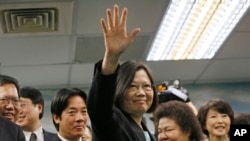An opposition Taiwan presidential candidate has pledged to seek a consistent, predictable and sustainable relationship with mainland China should she win next year’s election. Tsai Ing-wen, who heads the Democratic Progressive Party (DPP), told a Washington audience the independence-minded party believes a broad consensus exists in Taiwan to maintain the status quo.
Speaking Wednesday at the Washington-based Centers for Strategic and International Studies (CSIS), Tsai said it is critical Taiwan maintain a peaceful and stable relationship with China. She pledged that if elected in January, she would represent all of Taiwan’s people and pursue cross-strait relations that are "consistent, predictable and sustainable with [mainland] China."
"The conduct of cross-strait policy must transcend the position of a political party and incorporate different views. A leader must take into account public consensus when making decisions. We do have a broad consensus in Taiwan (and) that is maintenance of the status quo," she said.
Tsai said she will support legislation to establish a comprehensive set of rules to oversee cross-strait exchanges and negotiations. She added that agreements with Beijing currently under negotiation, or legislative review, will be re-examined and further negotiated under the new rules.
The ruling Kuomintang (KMT) party of President Ma Ying-jeou has sought closer ties with Beijing, but analyst Bruce Jacobs of Australia’s Monash University said the perception is that the mainland has benefited the most from the policy.
"The current government says that Taiwan is part of one China and that’s something that, historically, there is no real basis for making that claim, but the claim is made in the sense to have a closer relationship with China. In fact, that hasn’t worked. The Chinese have given the Ma government very, very little, even though it’s made certain sacrifices and I think one of the reasons the Ma government is unpopular is that it has made these silly approaches to China and I think Tsai Ing-wen would have strong support from the population of Taiwan if she were to push these policies," said Jacobs.
Jacobs said Tsai has never endorsed the so-called "1992 Consensus" that both sides accept that there is but one China.
Tsai also said that while she advocates constructive exchanges and dialogue with China, she promises to make the process democratic and transparent, and ensure economic benefits are equitably shared.
The Taiwan political leader believes that in order for Taiwan to be a reliable partner in regional security, it must make investments in a credible deterrent capability.
"In light of the increasing military and security threat that Taiwan faces, developing asymmetric capabilities that involve enhanced military relations with friendly forces, well-trained military personnel in a modern force structure and acquisition of necessary defense equipment are essential components of our deterrence strategy," she said.
The DPP official added that in addition to acquisition of foreign-made defense systems, she wants to see Taiwan develop its own indigenous defense programs. She also advocated closer economic and security ties with the United States.
Taiwan analyst Bill Sharp of Hawaii-Pacific University said the DPP is walking a tightrope trying to keep both Washington and the mainland happy, not pull any surprises and not advocate independence. He noted that under the previous DPP Chen Shui-bian administration Taiwan sought independence, but the current party leadership has to be more pragmatic.
“They want to be back in power and they realize if they advocate independence that will get a lot of people in Taiwan shook up. There is a certain percentage of people who might like that, but I believe the percentage if very small, just like there is a certain percentage of people in Taiwan who want unification with China now, but in both cases the percentage of very small,” said Sharp.
Sharp believes the forthcoming campaign in Taiwan will be based on domestic issues, such as the economy, not on cross-strait relations.
In her remarks Wednesday, Tsai said Taiwan is in economic stagnation and that, she says, impacts young people the most. She pledges to seek greater economic autonomy and less dependence on the Chinese market. She also says she wants to see a shift away from an efficiency-based economy to one driven by innovation. She says she will also seek membership in the 12-member Trans-Pacific Partnership free-trade agreement.










